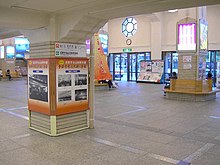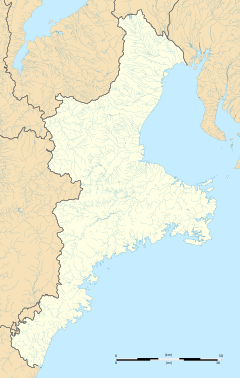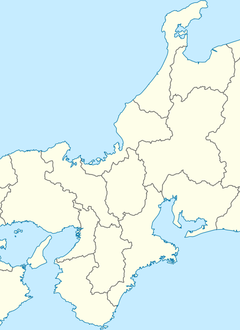| Ujiyamada Station 宇治山田駅 | ||||||||||||||||||||
|---|---|---|---|---|---|---|---|---|---|---|---|---|---|---|---|---|---|---|---|---|
 Ujiyamada Station frontage, July 2006 Ujiyamada Station frontage, July 2006 | ||||||||||||||||||||
| General information | ||||||||||||||||||||
| Location | 2-1-43 Iwabuchi, Ise City, Mie Prefecture 516-0037 Japan | |||||||||||||||||||
| Coordinates | 34°29′18″N 136°42′49″E / 34.488205°N 136.713733°E / 34.488205; 136.713733 | |||||||||||||||||||
| Operated by | ||||||||||||||||||||
| Line(s) | ||||||||||||||||||||
| Distance | 28.3 km (17.6 mi) from Ise-Nakagawa | |||||||||||||||||||
| Platforms | 1 side platform and 3 bay platforms | |||||||||||||||||||
| Tracks | 5 | |||||||||||||||||||
| Connections | ||||||||||||||||||||
| Construction | ||||||||||||||||||||
| Structure type | Elevated | |||||||||||||||||||
| Other information | ||||||||||||||||||||
| Status | Staffed | |||||||||||||||||||
| Station code | M74 | |||||||||||||||||||
| History | ||||||||||||||||||||
| Opened | 17 March 1931; 93 years ago (1931-03-17) | |||||||||||||||||||
| Passengers | ||||||||||||||||||||
| FY2019 | 5,484 daily | |||||||||||||||||||
| Services | ||||||||||||||||||||
| ||||||||||||||||||||
Ujiyamada Station (宇治山田駅, Ujiyamada-eki) is a junction railway station located in the city of Ise, Mie Prefecture, Japan, operated by the private operator Kintetsu. It is the closest station to Ise Grand Shrine and thus has an important role for tourists and pilgrims. The station also administrates the section between Kushida Station and Isuzugawa Station.
Lines
Ujiyamada Station is served by the Kintetsu Yamada Line and the Toba Line. It is 28.3 rail kilometers from the terminus of both lines at Ise-Nakagawa Station.
Station layout


Right: to Toba and Kashikojima
Left: to Iseshi Station
Ujiyamada Station has 2 through platforms and two bay platforms, a total of four. The platforms are on the third floor of the station building. The only entrance to the building is on the west of the first floor. A royal suite is located in the second floor. Originally a penthouse on the building's east end, it was used as a fire watch tower, and became the firefighting headquarters of postwar Ise.
Platforms
| 1 | ■ Yamada Line | returning for Ise-Nakagawa (partly) |
| 2 | ■ Yamada Line | returning for Ise-Nakagawa, Nagoya and Osaka |
| 3 | ■ Toba Line | for Toba and Kashikojima |
| 4 | ■ Yamada Line | for Ise-Nakagawa, Nagoya, Osaka, Kobe and Kyoto |
History
Ujiyamada Station was opened as the terminal station of the Sangu Kyuko Electric Railway on March 17, 1931. On March 15, 1941, the line merged with Osaka Electric Railway to become a station on Kansai Kyuko Railway's Yamada Line. This line in turn was merged with the Nankai Electric Railway on June 1, 1944 to form Kintetsu. Services to Nagoya began on January 20, 1920, and the line was extended from Ujiyamada to Isuzugawa Station on December 15, 1969. In 2001, the station building was named a Registered Registered Tangible Cultural Properties by the national government.
Passenger statistics
In fiscal 2019, the station was used by an average of 5484 passengers daily (boarding passengers only).
Surrounding area
- Ise Grand Shrine
- Chokokan Ise Grand Shrine History Museum
- Ise City Hall
- Ise sight-seeing information center
- Kōgakkan University
- Kōgakkan High School
- Ise High School
- Ise Technical High School
Gallery
See also
References
- Terada, Hirokazu (July 2002). データブック日本の私鉄 [Databook: Japan's Private Railways]. Japan: Neko Publishing. p. 248. ISBN 4-87366-874-3.
- ^ Kintetsu Company History
- Ujiyama Station page on Cultural Properties of Mie Prefecture (in Japanese)
- 三重県統計書 [Mie Prefectural Statistics] (in Japanese). Japan: Mie Prefecture. 2020. Retrieved 11 August 2020.
External links
![]() Media related to Ujiyamada Station at Wikimedia Commons
Media related to Ujiyamada Station at Wikimedia Commons
- Kintetsu: Layout of Ujiyamada Station (in English)
- Kintetsu: Ujiyamada Station (in Japanese)
- Ujiyamada Station page on Cultural Properties of Mie Prefecture (in Japanese)





